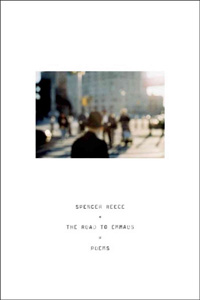 Spencer Reece, The Road to Emmaus: Poems (New York: Farrar, Straus, and Giroux, 2014), 127pp.
Spencer Reece, The Road to Emmaus: Poems (New York: Farrar, Straus, and Giroux, 2014), 127pp.
Spencer Reece (b. 1963) is an Episcopal priest and an award-winning poet, and thus the Biblical title of this book and many of its poems — "1 Corinthians 13," "The Prodigal Son," and "The Upper Room." Reece's work has appeared in The New Yorker, The American Scholar, and The New Republic, and enjoyed the support of Guggenheim, Fulbright, NEA, and other grants. His first book of poetry, The Clerk's Tale, won the Bakeless Prize in 2003 from The Bread Loaf Writers Conference at Middlebury College.
Many of these poems are rooted in geographic places, like Monaco (where he contrasts the glamour of the place with the loneliness of its inhabitants), Miami (where his candidacy for Holy Orders was confirmed), Boston (where he recalls the troubled life of his A.A. sponsor), New York City (where he meets his adopted brother), and Hartford (where he was born).
Other poems are rooted in specific places like an ICU ward, a nursing home, a prison, an orphanage, Thomas Merton's grave ("we can never be with loss too long"), a Coming Out Group at a community center, and his therapist's office.
Reece is especially interested in the complex dimensions of the human heart: "How faceted, coveted, and intricate, the heart! / Behind its casements, / fixed in its singular setting, who owns it?" ("Monaco"). Again, from "Gilgamesh," a question: "How to construct the architecture of the heart?"
I resonated with his several poems about his ambiguous relationship with his parents that softened over the years. He admits that he had "judged harshly" their marriage, and that "for a decade I did not speak to my parents." The poem "The Fifth Commandment" ("Honor your father and mother.") contemplates a visit with his aging parents, when they count out their pills each night and "the dash between their dates is nearly closed." In "The Prodigal Son" he concludes: "Mother and father, / forgive me my absence. / I will always be moving quietly toward you."
Reflecting on his dual calling, Reece writes, "A poet, like a priest, works with facts and mysteries: the facts mysterious, the mysteries factual."


